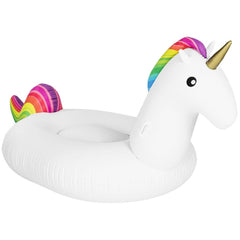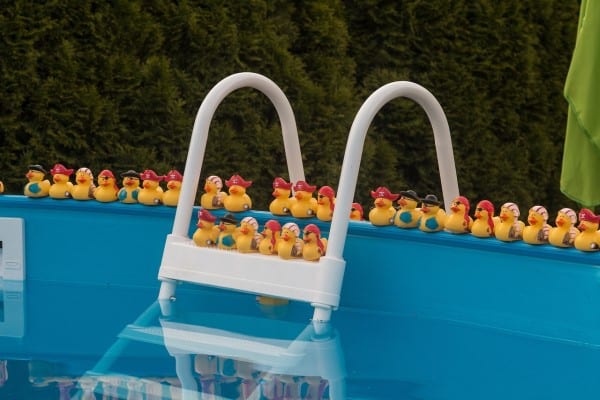Depending on where you live (north or south) you are likely in the path of migratory or native species of water-birds or ducks. If you own a swimming pool, you may get a visit from flying creatures that are on their way to their winter or spring home. Now if you are like most people, it’s pretty cool to see a few ducks paddling away in your pool. It could be that you haven’t given much thought to whether or not it’s safe to share a watering hole with ducks. Heck, you might even decide to feed them some bread to try to get them to stay for a while. But you may have wondered, is it safe to share the water with ducks, geese, or other waterfowl?
No it’s not safe to share a swimming pool with ducks. There are a number of germs found in duck and goose droppings that can transmit to humans, such as E.coli, Salmonella, Campylobacter, and Cryptosporidium.
So as cute as they are, it’s not a good idea to invite duck, geese, or other waterfowl to set up residency in your backyard aquascape. To be honest, this is a temptation entertained my many-a-pool-owner. But before inviting your new swimming pool tenants to permanently set up shop, consider; Why do ducks like swimming pools anyway? How can you keep ducks from choosing YOUR pool as a temporary home?, and finally, How should you safely (and legally) handle ducks that simply won’t leave?
Why do ducks like swimming pools?
Not all that different from us humans, ducks, and other birds like clean safe warm water to bathe in and recreate in. What better to fill the bill (no pun intended) than a swimming pool that is being cleaned regularly, is a small body of water so it’s warm, and they know without a doubt that there are no natural predators around to antagonize them. From a ducks point of view your swimming pool checks all the boxes. An added bonus for the ducks is if your pool is near its natural path on its regular migration.
It does happen that ducks will find their way to swimming pools due to being a little confused or lost. We once had a client that lived near a municipal lake that had a huge population of geese. It wasn’t all that uncommon for the geese to mistake our client’s pool for their winter home because the pool had many of the same characteristics of the lake. It was clean, it had a dark bottom, and they could also hear the rest of the flock.
What ducks and geese and really any animals don’t realize is that there is no natural food source for them in your pool. And in the case of a mama duck and her ducklings, the pool is a very dangerous place to set up shop. The ducklings need to get out of the water to dry off until they get their adult feathers, and quite often they can’t get out of the slippery steep walls of a swimming pool and will often drown.
Why are ducks so unsafe for swimming pools?
Adult ducks that come and go like they own the place pose a hazard to bathers of a swimming pool. You won’t really notice it with ducklings. However, adult ducks and especially geese will make a horrible mess in and around a pool as they naturally leave excrement, feces, behind. Not only will this quickly become a maintenance headache, but it is incredibly unsanitary and hazardous to human health. If given the chance to break down, any germs contained in the droppings will now be in the pool water.
If the pool’s chemical treatment is substandard in any way, these germs will have an opportunity to survive and infect unsuspecting human bathers. This is a great reason to maintain a minimum of 3.0 parts per million of chlorine, as well as a pH of 7.4 – 7.6 in a swimming pool at all times. This effectively destroys any germs that enter the pool. Even Cryptosporidium which is chemical resistant will breakdown with a little bit of time.
Keeping chemicals up to the right balance is of course the best way to keep from the dangers of spreading germs, viruses, and disease in pool water. However, you still have to deal with the fact that there is bird poop in your pool. The CDC has some recommendations on how to deal with this and it’s actually the same procedure as if a human had such an accident in the pool. Check out those guidelines here if you like.
Follow these steps to remove bird droppings and disinfect the water:
- Close the pool to swimmers.
- Put on disposable gloves.
- Remove the bird droppings using a net or bucket. Do not vacuum the droppings from the pool.
- Clean off any debris or dirt from the item used to remove the bird droppings.
- Disinfect the item used to remove the droppings by immersing it in the pool during the 30-minute disinfection time described below.
- Remove and dispose of gloves.
- Wash your hands thoroughly with soap and water immediately.
- Raise the free chlorine concentration to, or maintain it at, 3 parts per million (ppm); maintain the pH level at 7.5 or less; keep the temperature at 77°F (25°C) or higher. The free chlorine and pH should remain at these levels for 30 minutes.
- Confirm that the filtration system is operating properly.
The above is a direct quotation from the CDC website
This is all great for the cleanup side of things, but who wants to deal with that all the time?! No one. Let’s explore how to keep these cute, yet filthy, animals out of your pool for good.
How can you keep ducks from choosing YOUR pool as a home?
- Take away any food source that may be attracting them to the pool vicinity whether intentional or unintentional. Trip back nut or fruit-bearing trees or bushes.
- Trim back or remove shrubbery that could encourage nesting. For ducks this will be low to the ground hiding spots.
- Stop feeding them. Yes, I repeated this one. These birds can find food naturally, they don’t need us to feed them.
- String lane flags over your pool. This will disrupt ducks and geese’s landing and take-off zones which will encourage them to go elsewhere.
How should you safely (and legally) handle ducks that simply will not leave?
It is important to note that The Migratory Bird Treaty Act of 1918 and State laws protect all native
waterfowl in the United States, including migratory and resident Canada geese. That means you have to be very careful about how you attempt to banish these birds from your pool.
To keep the ducks and geese safe as well as you, don’t attempt to handle them or even “shoo” them. What I have found to work are floaties. Pick up a bunch of beachballs, large floating sharks, alligators also work well. And if you don’t have access to those, simple donuts and floating mats will do.

Leave the floaties in the pool, anchor them if needed. The floaties will naturally move around as the breeze shifts and this will disrupt the duck’s ability to float and preen and eventually they will vacate. You will likely need to keep up the floaties for a few weeks until the ducks have found a new location. In the case of migrating birds, you may have to put the floaties out for 1 or 2 migrations until the next generation has been trained to go to another spot.
If at the end of all your efforts to evict your unwanted feathered tenants, you may need to hire a professional or consult your state’s wildlife agency. Call 1-866-4USDA-WS; 1-866-487-3297.
The last thing you should do is let the ducks stay or even encourage it by feeding them. As I have shown above, these things can bring about some pretty serious headaches that can actually be quite costly. Fear not, however, you can always go to your local lake or pond and visit your fowl friends in their natural habitat.
Check out the next article to see where pool algae come from and how to manage it.
Recent Posts
The Origin of Green Algae in Swimming Pools: Unveiling the Culprit
Swimming pools are synonymous with relaxation, fun, and refreshing dips during hot summer days. However, the appearance of green algae can turn this enjoyable experience into a frustrating one. Green...
At the heart of every pool is a filter pump that needs to be run every day for a specified length of time. Rather than try to remember to turn a pool pump on and off every day, pool builders and...


